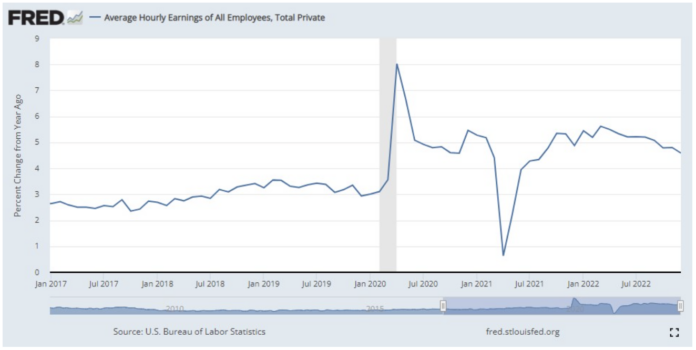No Recession
Courtesy of Michael Batnick, The Irrelevant Investor
A recession seemed all but inevitable last year. A war was raging in Europe, energy and food prices were surging, the fed was aggressively raising interest rates, the stock market was in free fall, consumer confidence was collapsing, and wages were rising at a blistering pace.
But the year came and went, and a recession never did.
It’s a new year, but recession fears still abound. Two-thirds of economists expect one in 2023. I was also in that camp in 2022, but now I’m not so sure.
We spoke with Derek Thompson last week about the economy’s prospects for 2023, and I did a lot of on the one hand, on the other hand. I can see both sides now more than ever. He made me choose between yes or no, and I surprised myself when I said, “No recession.”
The economic data that came out on Friday made me feel better about a possible soft landing.
With all eyes on inflation, the stock market would ordinarily respond negatively to a strong jobs number, but there was something inside this report that the market loved; wages. Earnings are one of the biggest drivers of inflation; unfortunately, it’s the hardest area for the fed to influence. So when year-over-year numbers fell to 4.6%, their lowest level since last August, the market cheered. The fears of a wage spiral seem to have been overblown.
In an uncertain economy that faces a myriad of risks, the fed seems to be the biggest one. But now that we’re getting some good numbers on the wage front, the market is expecting them to slow down dramatically. So what if after all this worrying about the fed being behind the curve and then going too far too fast, they actually pull off the soft landing? We’re already seeing signs that inflation peaked and is on its way down. The job market is strong, but wages aren’t spiraling. We still need to see stabilization in the mortgage market for the housing market to thaw out, but the good news is stocks are acting like that might happen.
Lennar and the rest of the home builders are near 52-week highs. And speaking of stocks, something happened on Friday that is worth talking about. Caterpillar closed at an all-time high. Cat is the world’s largest construction and equipment manufacturer. If we were going into recession like all the economists seem to think, the industrial sector would not be just 6% from an all-time high. Stocks tend to rally when the fed pauses, so this could explain the surprising strength we’re witnessing in certain areas of the market. Even though the forward-looking stock market doesn’t always get it right, give me the market over the economists ten out of ten times.
If you knew that inflation would be above 7% all year in 2022, you could have absolutely crushed the market. Short bonds, short stocks, and chill. That’s not how this year will unfold. Even if I knew we’d avoid a recession, I’m not sure I could tell you how the stock market would do. My best guess would be a double-digit gain, but it’s possible that avoiding a recession means the fed doesn’t need to lower rates. And if they remain elevated, at least relative to recent times, then it’s very possible that multiple contractions persist as investors find an equilibrium between higher rates and the value they’ll place on earnings.
We’re not out of the woods yet. Not even close. But for the first time in a long time, there are reasons to be optimistic.




